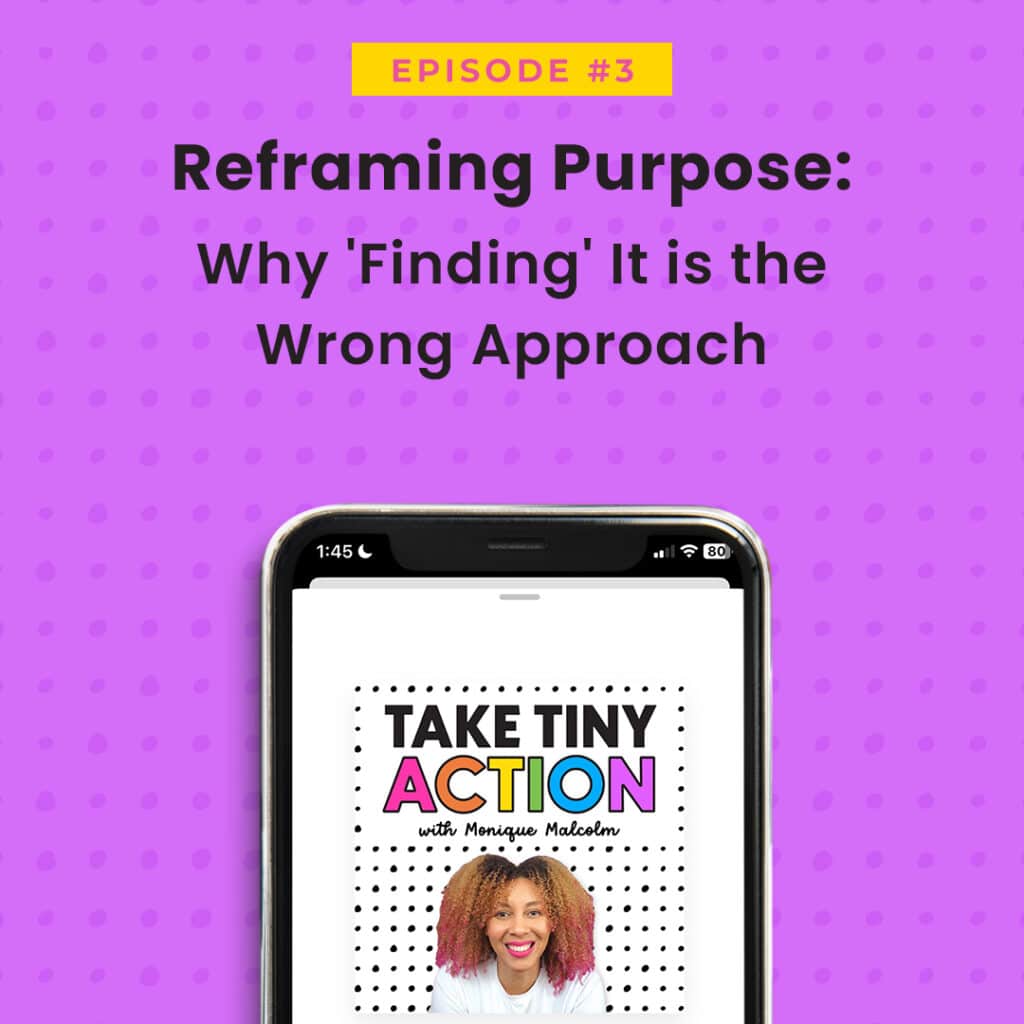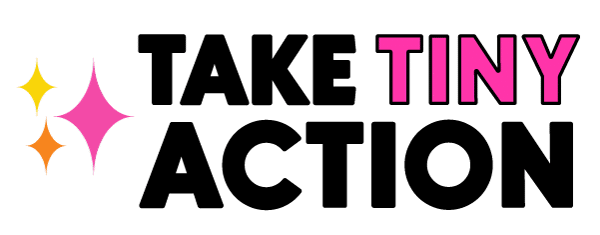
Today’s episode was inspired by a conversation I recently had with a close friend.
This friend is in a space where she’s trying to figure out ‘what’s next?’ She’s done all of the things: gone to college, has a great career, bought a house, and has begun to build wealth. But since she’s single, she’s not sure what it’s all for. She is frustrated because, despite searching for years, she still hasn’t found her purpose.
I asked my friend, “If she had ever considered that she gets to choose her purpose or even create?”
She said, “No.” But I could hear the awe in her voice as she turned the idea over in her mind. She’d honestly never considered that purpose is a choice.
And there it is. Another example of how society conditions women to believe we lack choice. I hate this for us.
This type of thinking is a limiting belief, and it’s been normalized. It’s so normal that we actively spew it as good advice.
“You have to find your purpose.”
I believe this idea of needing to ‘find’ your purpose places a heavy burden on women. We are already burdened with many societal expectations and norms. Feeling like our lives aren’t purposeful because we haven’t found our elusive purpose shouldn’t be one of them.
Having a sense of purpose is often closely linked to overall well-being and happiness. Having a clear sense of what we’re working towards and why can provide us with a sense of direction, motivation, and fulfillment that is difficult to achieve without a purpose.
Knowing your purpose is important because it allows you to tap into your unique combination of skills, interests, and values in a way that feels authentic and meaningful to you. Rather than simply following the path that society or others have laid out for you.
Rethinking Purpose
Let’s talk about rethinking purpose. There are a few common misconceptions that we make when talking about purpose that I’d like to dispel:
Thinking that purpose is a fixed or predetermined thing. I take issue with the idea that we have to “find” our purpose. It’s misleading. It suggests that there is a pre-existing, fixed purpose that we must uncover or discover as if it has been lost or buried.
Where would we look? We don’t have a map. We don’t have instructions. Would we know it was our purpose if we saw it?
When we think about purpose as something that we create rather than something we find, it changes the whole game. Instead of feeling like we’re searching for something outside of ourselves, we’re empowered to take ownership of our lives and actively work towards something that feels meaningful and fulfilling.
Of course, this can be easier said than done. It requires us to know ourselves and understand what drives us, what makes us happy, and what we value. It also means being willing to take risks, make mistakes, and pivot when necessary. But the beauty of creating our own purpose is that we get to be in the driver’s seat of our own lives.
Believing that purpose is solely an individual pursuit. While it’s true that finding one’s purpose is a personal journey, it’s important to remember that purpose can also have broader social and community implications. By aligning our purpose with the needs of others, we can create a sense of purpose that goes beyond just our own personal goals and ambitions.
Focusing too much on external validation. It’s easy to fall into the trap of thinking that our purpose is determined by external factors like job title, social status, or financial success. But true purpose comes from within and is not dependent on external validation or recognition.
Believing that purpose is a destination. Purpose cannot be achieved or obtained, like a goal or objective. Rather, it’s an ongoing growth, learning, and self-discovery process. It’s important to focus on the journey of creating and cultivating purpose rather than solely on the end result.
Feeling pressure to have a “perfect” purpose. Sometimes, we can feel pressure to have a clear, well-defined purpose that is aligned with our passions and talents. But it’s okay to have a sense of purpose that is evolving and changing. We don’t have to have everything figured out right away – purpose is a lifelong journey of self-discovery and growth.
The Process of Creating Your Purpose
So, how do you begin to create your purpose? There are several steps that you can take:
Self-reflection
The first step is to take some time to reflect on your values, interests, and goals. Ask yourself questions such as “What do I care about?” “What am I passionate about?” and “What do I want to achieve in my life?” This process can help you identify the most important things to you and start to develop a sense of your purpose.
Identify your strengths
Next, take some time to identify your strengths and skills. What are you good at? What do others consistently compliment you on? Identifying your strengths can help you find ways to apply them to a meaningful and fulfilling purpose.
Try taking a strengths assessment, such as the CliftonStrengths assessment, to identify your natural talents and abilities. Use this information to help you identify how you can best use your strengths to create your purpose.
Experiment
Purpose is not something that is always immediately apparent. It may take time to discover what feels truly meaningful and purposeful to you. So, it can be helpful to experiment with different activities and experiences to see what resonates. This might mean trying out new hobbies, volunteering for different organizations, or pursuing new career paths. Trying new things can help you discover new interests and passions that can inform your purpose.
Reflect on what brings you joy
Pay attention to the things that make you happy and fulfilled. What activities or experiences leave you feeling energized and inspired? When do you feel most alive and engaged? These can be important clues to help you identify your purpose.
By taking these steps, you can begin to create a purpose that is authentic and meaningful to you. Remember, purpose is not something that is static or fixed. It’s essential to recognize that our purpose may change over time as we grow and evolve, and that’s perfectly okay. So, be open to new experiences and opportunities that can help you continue to grow and develop your sense of purpose.
Aligning Your Purpose with Action
Without action, your purpose remains just an idea, dream, or abstract concept. It’s important to identify specific actions that align with your purpose and to take intentional steps toward them.
Here are some tips for identifying concrete steps you can take to live out your purpose:
- Reflect on your values: To align your purpose with action, it’s important to first identify your core values. What matters most to you? What motivates and inspires you? Once you have a clear sense of your values, you can start to identify actions and behaviors that align with them.
- Set specific goals: While purpose is not a destination, setting specific goals can help you translate your purpose into actionable steps. Think about what you want to achieve and set specific, measurable, achievable, relevant, and time-bound (SMART) goals to help you get there.
- Start small: Creating your purpose doesn’t have to be a massive undertaking. Start small by identifying one or two concrete steps you can take towards living out your purpose. For example, if your purpose is to help others, you could start by volunteering for a local organization or simply offering to help a friend in need.
- Seek out opportunities: Look for opportunities to live out your purpose in your daily life. This can be as simple as engaging in meaningful conversations with others or seeking out activities that align with your purpose. You can also look for volunteer opportunities or join organizations that align with your purpose.
- Take action consistently: Consistent action is key to living out your purpose. Set aside time each day, week, or month to take concrete steps toward your goals. Even small actions can add up over time and make a significant difference in living out your purpose.
Some food for thought – While it’s important to identify and pursue your passions and interests, true fulfillment often comes from positively impacting others and the world around you.
Focusing solely on personal fulfillment can lead to a self-centered mindset that can ultimately leave us feeling unfulfilled. On the other hand, when we align our purpose with the needs of others, we create a sense of meaning and purpose that goes beyond ourselves.
Incorporating this perspective into the process can help you identify ways to impact your community or the world positively. It can also help you find deeper meaning and fulfillment in your life.
Conclusion
The idea of “finding” your purpose can be limiting and misleading. Your purpose is not a fixed destination you need to search for but a journey that you can actively create and cultivate within yourself. By identifying your values and passions, setting clear goals, incorporating your purpose into your daily routine, seeking out opportunities, and reflecting and adjusting along the way, you can create a sense of purpose that is fulfilling, meaningful, and aligned with your true self.
Creating your purpose is a process that takes time, patience, and intentional action. It’s okay if you don’t have all the answers right away or if your purpose evolves over time. The important thing is to stay committed to your journey and to be open to new possibilities and experiences along the way.
So if you’re feeling lost or stuck in your life, don’t despair. Take a step back and start taking intentional actions toward creating your purpose. Remember, the power to live a purposeful life is within you, and it’s never too late to start.
As the philosopher Aristotle once said, “Pleasure in the job puts perfection in the work.” When you create your purpose, you find that pleasure in the job that puts perfection in your work. You become passionate about what you do, and that passion fuels your desire to make a positive impact on the world. So why wait? Start creating your purpose today and live a life filled with meaning, fulfillment, and fun.
Take Tiny Action Today – I want to encourage you to reflect on your own sense of purpose and actively cultivate it.
Set aside a minimum of 30 minutes to journal through the following questions:
- What activities or hobbies do I enjoy the most?
- What values are most important to me?
- What skills or strengths do I have that I’m proud of?
Look at your answers and try to find the thread that connects them. It might give you some clues about your purpose.
Additional Resources
Books
- “The Alchemist” by Paulo Coelho
- “Designing Your Life: How to Build a Well-Lived, Joyful Life” by Bill Burnett and Dave Evans
- “The Power of Purpose: Find Meaning, Live Longer, Better” by Richard Leider
- “Start with Why: How Great Leaders Inspire Everyone to Take Action” by Simon Sinek
Journaling prompts:
- What are three things that bring you the most joy?
- Think of a time when you felt truly alive and fulfilled. What were you doing? What values or passions did it align with?
- What is a value that you hold dear? Why is it important to you?
- What is something that you feel strongly about? Why do you feel that way?
- What activities or hobbies do I enjoy the most?
- What skills or strengths do I have that I’m proud of?
